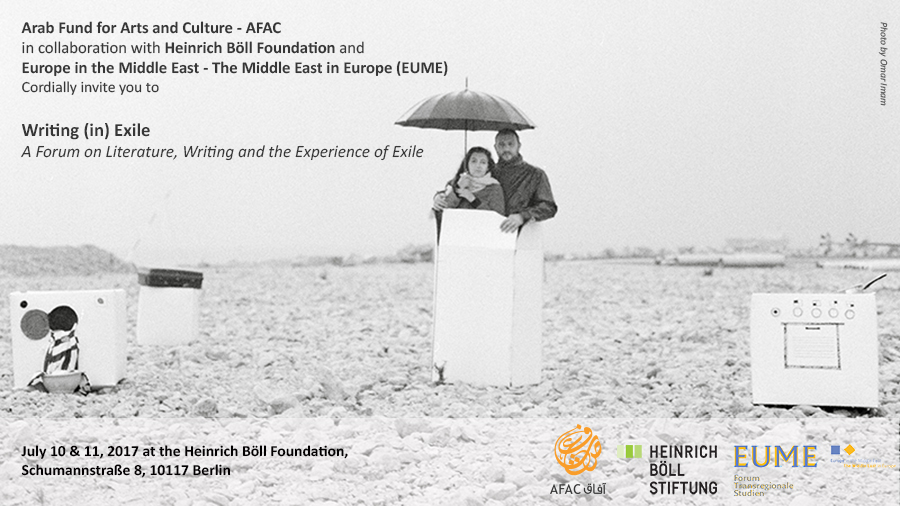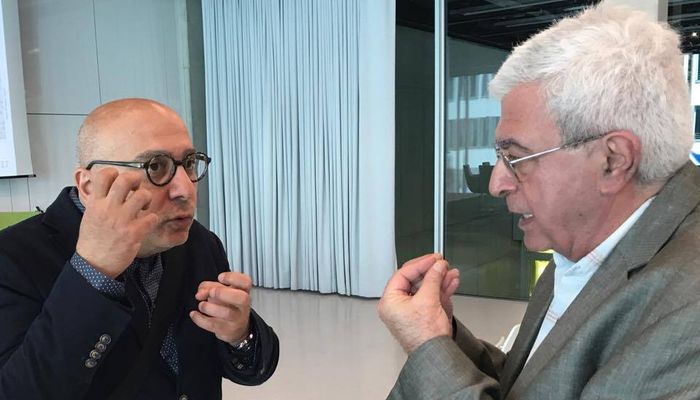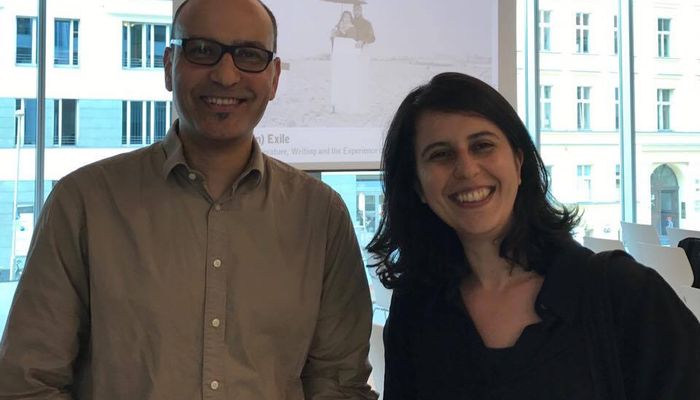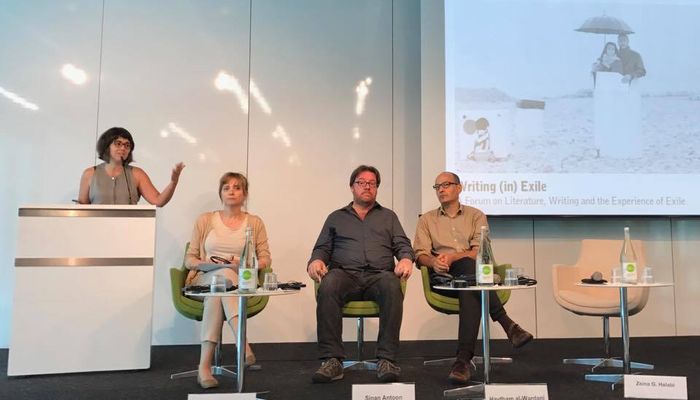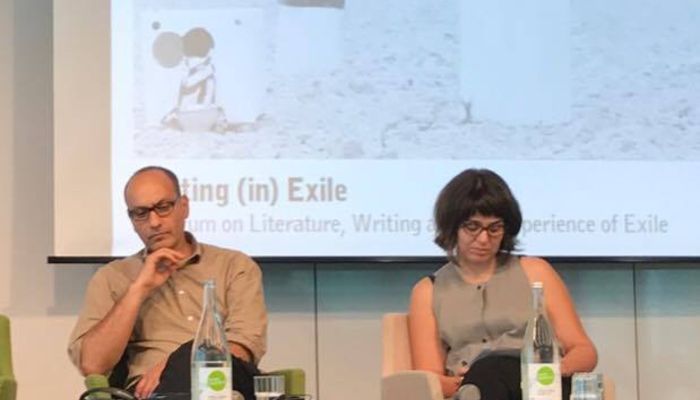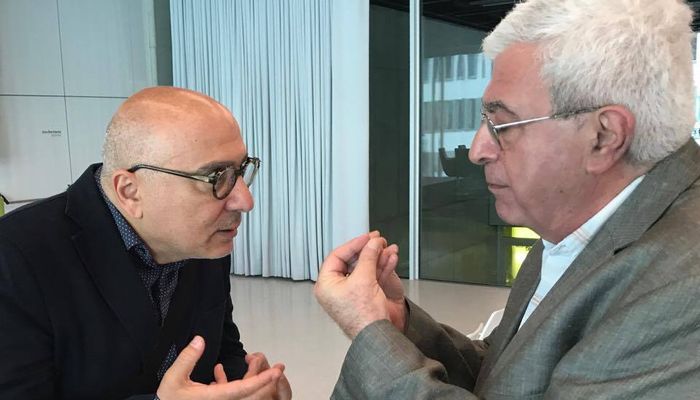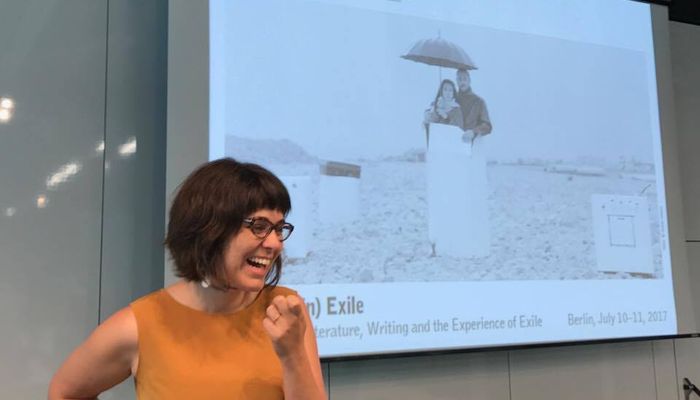This Forum is dedicated to exploring the relationship between the act of writing and the lived experience of migration, forced or voluntary displacement, and exile in Arabic literature and host cultures. For over half a century now, exilic literature by writers from the Arab world to Europe or the Americas has come to embody a vast, polyphonic and diverse genre, that has blurred, changed, and expanded the boundaries of Arabic and other literatures.
This Forum proposes a critical revisiting of these legacies and the contemporary literary production by authors from Arab countries. How do the writings of migrant and/or exiled writers from Arab countries relate to concepts of literary genres in Europe, such as exilic literature in Germany? How does the language, the poetics, the concepts, and idioms of literature change when geography becomes memory, societies are torn apart, homes abandoned or destroyed, and translation overwhelms the lived present.
The event will include conversations and panel discussions by renowned European and Arab academics and writers, as well as readings by emerging exiled Arab writers.
Schedule
Mo, July 10
10:00 - Welcome Speeches
Claudia Simons (Political advisor in the Africa division of Heinrich Böll Foundation)
Rima Mismar (Executive Director, Arab Fund for Arts and Culture)
10:15 - Opening Keynote
Exile and Arab Literature
A Conversation between Elias Khoury and Farouk Mardam-Bey
Introductions: Rasha Salti
11:45 - Coffee Break
12:15 - Panel Discussion
Ghosts, Guests and the Canon
Nikola Richter, Zeina G. Halabi, Kader Konuk
Chair: Georges Khalil
16:00 - Panel Discussion
Chronicles of Exile
Mohammad al-Attar, Saleem al-Beik, Maha Becker, Golan Haji, Yamen Hussein
Chair: Refqa Abu-Remaileh
19:00 - Live Reading
Chronicles of Exile and Home
Assaf Alassaf, Yamen Hussein, Lina Atfeh, Maha Becker
Tue, July 11
11:00 - Panel Discussion
Writing and Migration within Languages
Rawi Hage, Khaled Osman
Chair: Friederike Pannewick
15:00 - Panel Discussion
Mother Tongues and In-Between Worlds
Samar Yazbek, Haytham El-Wardany, Sinan Antoon
Chair: Zeina G. Halabi
Contributors
Elias Khoury was born in Beirut. He studied Sociology and History at Lebanese University in Beirut and the University of Paris. He began his career as a literary critic with his book, Searching for a Horizon: The Arabic Novel after the Defeat of 1967 (1974). He was a prominent figure of the Beirut vanguard in modern Arabic literature. To date, Elias Khoury has published more than twelve novels that have been translated into several languages, and four books of literary criticism. His also known as a playwright, three of his plays were performed in Beirut, Paris, Vienna and Basel. He served on the editorial board of Mawakif Quarterly, and as the managing editor of Palestine Affairs and of Al Karmel Quarterly. His academic career includes teaching at New York University, Columbia University, the Lebanese University, the American University of Beirut, and the Lebanese American University. Khoury is a board member of the Arab Fund for Arts and Culture since May 2016.
Farouk Mardam Bey was born in Damascus in 1944 and studied Law at the University of Damascus, political science in Cannes and Paris I, and education, history and social sciences at the Paris VII. He worked as curator of Arabic books at the Library of the National Institute for Oriental Languages and Civilizations in Paris (1972-1986), an editor then director for the magazine Palestinian Studies (published in French, 1981-2008), and consultant for the Institut du Monde Arabe (1989-2008). Since 1995, he is director of the Sindbad series at Actes Sud, dedicated to translating Arabic works into French. Co-written with Samir Kassir in French, he published a book in two volumes entitled Itineraries from Paris to Jerusalem: France and the Arab-Israeli Conflict (Journal of Palestine Studies, 1992-1993), Being Arab with Elias Sanbar (Actes Sud, 2007), and Our France with Edwy Plenel and Elias Sanbar (Actes Sud, 2011), in addition to three books on the history of food. He also edited and published a number of collective historical, political, literary and bibliographical publications and translated to French the works of Palestinian poet Mahmoud Darwish. He lived in France since 1965.
Nikola Richter is the founder of the Berlin independent publishing house mikrotext for new narratives and texts with attitude. Most titles are published in German, a selection is made available in English. mikrotext publishes literatures that often are related to recent political discussions and new forms of writing on the web. In 2014 she was awarded the Young Excellence Award by the German booksellers‘ and publishers‘ association for her work with mikrotext. In 2016 she was honored with the label Berlin‘s Best by Creative City Berlin. She is generally interested in the recent and future relationship between the web and the arts, in new artistic formats and engaged, recent topics.
Zeina G. Halabi is Assistant Professor of Arabic Literature at the American University of Beirut. She specializes in modern Arabic literature with particular interest in questions of loss, mourning, and dissidence in contemporary literature and visual culture. She was a 2012-2013 EUME fellow at the Forum for Trans-regional Studies in Berlin, where she worked on her first book, The Unmaking of the Arab Intellectual: Prophecy, Exile, and the Nation (Edinburgh University Press, 2017), in which she examines the depiction of Arab intellectuals in post-1990s fiction and film. She has authored articles on the shifting notion of political commitment in the writings of canonical and emerging Arab writers. She is currently working on her second book project provisionally entitled Excavating the Present: History, Power, and the Arab Archive, which explores archival practices in contemporary literature.
Kader Konuk is Professor and Chair of Turkish Studies at the University of Duisburg-Essen in Germany. Between 2001-2013 she was Assistant and Associate Professor of Comparative Literature and German Studies at the University of Michigan. Trained as a comparatist in German, Turkish, and English literature, Kader Konuk focuses on the disciplinary nexus between literary criticism, cultural studies, and cultural history. Her research is situated at the intersections between Jewish, Christian, and Muslim communities, beginning with the Ottoman modernization reforms and continuing on to Turkish-German relations in the twenty-first century. Her work examines cultural practices that evolve in the context of East-West relations (ambassadorial missions, travel, migration, and exile). In her monograph East West Mimesis: Auerbach in Turkey (Stanford UP 2010), she investigates the relationship between German-Jewish exile and the modernization of the humanities in Turkey. East West Mimesis won the prizes for the best book in both of her disciplines. It was selected for the René Wellek Prize by the American Comparative Literature Association and the DAAD award by the German Studies Association. In her current book project, Kader Konuk questions the common equation of secularism with Western modernity and is interested in the connection between religious critique, the freedom of speech, and literary discourses in the history of republican Turkey.
Georges Khalil is the Academic Coordinator of the Forum Transregionale Studien, and of the research program Europe in the Middle East—The Middle East in Europe (EUME). He was the Coordinator of the Working Group “Modernity and Islam” (AKMI) at the Wissenschaftskolleg zu Berlin from 1998-2006. He studied History, Political Science and Islamic Studies in Hamburg and Cairo, and European Studies at the Europa-Kolleg Hamburg. He co-edited Di/Visions. Kultur und Politik des Nahen Ostens (2009), Islamic Art and the Museum. Approaches to Art and Archeology of the Muslim World in the Twenty-First Century (2012) and Commitment and Beyond: Reflections on/of the Political in Arabic Literature since the 1940s (2015).
Mohammad Al Attar is a Syrian playwright and dramaturge, born in Damascus (1980).He graduated with a degree in English literature from Damascus University in 2002, and a degree in Theatrical Studies from the Higher Institute of Dramatic Arts in Damascus in 2007. He also received a Masters in Applied Drama (with special focus on the political & social role of theater), from Goldsmiths, London in 2010. His theatrical works - Withdrawal, Samah, Online, Look at the street...this is what hope looks like, Could You Please Look into the Camera?, A Chance Encounter, Intimacy and Antigone of Shatila- have been performed internationally on acclaimed stages and festivals. His last piece, While I was Waiting, directed by Omar Abusaada, which is still in tour, was selected for the official program of the 70th edition of Festival d’Avignon. He is now preparing a new adaption of Euripides’s Iphigenia, for the new season of Volksbühne Theater, Berlin. Some of his works have been published in English, German in addition to Arabic. He has written for numerous magazines and newspapers, with a special focus on the Syrian Uprising.
Saleem Al-Beik is a Palestinian writer who hails from Tarshiha in the Galilee, but was born in Abu Dhabi in 1982, and was raised in Syria. Presently he has been living in Toulouse, in France, since 2013. In 2017, he published Two Tickets to Saffuriyyah (Dar Al-Saqi, Beirut), with support from AFAC, in the framework of the AFAC Novel Writing Program”. He published: All You Need Is Water (Dar Al-Raya Publishing House, Haifa) a poetry collection in 2015, Cherry or Red Fruit for Cheesecake (Dar Al Ahliya, Amman, and Al-Qattan Foundation, Ramallah) in 2011, a collection of short stories that received the Young Writer Award from Al-Qattan Foundation; Sins of a Refugee (Dar Kanaan, Damascus) a collection of prose poems in 2008. He is also a film critic for the Arabic-language daily, Al-Quds Al-Arabi, and he is the editor of Romman, an online magazine dedicated to the culture, politics, art and literature, specifically regarding Palestine and Syria, where most of the contributors are refugees from both countries.
Maha Becker was born in 1967 in Al-Qamishli, in Syria. She studied Arabic Language at the University of Aleppo, and is presently living in Herford, in Germany. She began writing poetry in 1987, her poems have been published in numerous newspapers and magazines. They include Tall Black Dress, The Tree of Names and Maria Avedis.
Golan Haji is a Syrian Kurdish poet and translator writing in Arabic. He was born in Amouda, and presently lives in France. He was trained as a pathologist and practiced medicine in Damascus until 2010. Haji has published numerous articles, reviews and translations in Arab and international publications, and has contributed to artist catalogues and books, such as What Solitude Says (with Elena Lydia Scipione, in English and French, edition by La Friche de la Belle de Mai, Marseille, 2014). He has published several collections of poetry including Scale of Injury (edition by Al-Mutawassit, Milan, 2016), Autumn Here is Magical and Vast (in Arabic and Italian, Il Sirente, Rome, 2013), Adulterers (in Danish, edition by Korridor, Copenhagen, 2011). In 2016, in collaboration with Estayqazat, a Syrian feminist movement, he published edited Until the War (edition by Riad El-Rayyes, Beirut, 2016), a collection of interviews with women about the Syrian uprising. His translations include Alberto Manguel’s A Reader on Reading (edition by Dar Al- Saqi, Beirut, 2016), Dan Wylie’s Elephant (edition by Kalima Project, Abu Dhabi, 2014), and Anton Chekhov’s Notebooks (Dar Rufuf, Damascus, 2011) among others.
Yamen Hussein is a Syrian journalist and poet based in Germany since late 2014. He fled Syria after he was pursued by the Syrian authorities. He published his first article in 2006, in which he criticized the sectarian trends at Al-Baath University and the role of the Syrian regime in their propagation. Between 2007 and 2011, Hussein wrote reports and articles published in several websites and newspapers that examined the social and political situation and the lack of freedom of opinion in Syria. In 2014, he received a grant for Writers in Exile from Pen Zentrum. Since he has settled in Germany, he has participated in several literary festivals and poetry evenings such as the Brecht Festival in Augsburg, the Munich Literary Festival, the Frankfurt Book Fair and others. His poetry and prose have been published in several Arab newspapers, including Al-Hayat, Al-Mustaqbal, and Al-Quds Al-Arabi. Some of his poetic texts have been translated to French, German, English and Spanish. He also participated in the German-language anthology To Be Here - To Be Gone, launched in October 2016 at the Frankfurt Book Fair. At the Munich Literature Festival in 2016, his texts were translated to German and coupled with a selection from the late German poet Wilhelm Müller, to create a dialogue between the East and the West - the German romantic period and the contemporary Arabic literature. He is currently printing his first poetry work in Arabic titled 3439 Kilometers.
Refqa Abu-Remaileh is a Postdoctoral Research Fellow affiliated with the Forum Transregional Studies’ EUME programme and the Free University Berlin. Her research focuses on Palestinian literature and film. She is also the Palestine-Israel Projects Director at the Oxford Research Group, a London-based think-tank specializing in conflict resolution.
Assaf Alassaf is a writer from Syria who has been living in Berlin since 2015. He was born in Deir ez-Zor in 1976, and graduated from Damascus University’s School of Dentistry. He left Syria in 2013, heading for Mauritania, then Lebanon, then Germany. He has published a number of articles in print and web media, in Syria and the Arab world. He has also maintained a blog spot, a collection of which was published in German and Arabic, in Germany and Lebanon, under the title Abu Jürgen, my Diary with the German Ambassador. He has participated in numerous festivals, literary conferences and public readings in Germany, Lebanon and several European countries.
Lina Atfeh is a poet and writer born in 1989 in the city of Al-Salamiya in Syria. She graduated from the Arabic Language Department at the University of Damascus. She has published articles in several Arab cultural journals and periodicals, as well as a poetry collection titled On the Margin of Survival (edition The Arab Institute for Research & Publishing). In 2006, she was prevented from participating in any cultural or literary activity after a lecture she had delivered at the cultural center of Al-Salamiya, and was accused of insulting the Holy Spirit and the position of the head of state. She was active in peaceful protests against the Syrian regime and was exiled to Lebanon. She later moved to the city of Herne in North Rhine-Westphalia in Germany, where she has been living since November 2014. Atfeh participated in the first Syrian Poetry Festival in Cologne, and contributed to the anthology of Germany´s immigrant writers Weg sein – hier sein (edition by Secession Publishing House, Frankfurt, 2017). She has participated in several poetry evenings in Munich, Berlin and Cologne, and is currently collaborating in the Weiter Schreiben project with Wir machen das.
Ashraf Kateb is a Syrian-German violinist, composer and conductor, who was born in Aleppo, Syria, and studied violin at music academies in Aleppo, Moscow, Berlin and Cracow. He has lived in Berlin since 1992 and has participated in many international festivals, performed with many music celebrities, including Justus Franz, Leonard Bernstein, Lord Yehudi Menuhin, Sir Georg Solti, Mistislav Rostropovitch, Igor Oistrakh, Gidon Kremer and others. His first CD, Gesture, was released in 2001, in which he is accompanied by the Syrian-German pianist Gaswan Zerikly. In 2010 he published another CD titled Dia Succari, Composer from my Aleppo, that featured the complete compositions for violin by Syria composer Dia Succari, accompanied by 22 pianists from 21 different countries. In 2015, he was the music director and one of the composers for Intima, a fusion of visual art, dance, and music.
Rawi Hage, born in 1964 in Beirut, is a child of the war. At the age of eighteen, Hage immigrated to the United States. In New York, after Arabic and French, he adopted his third language, which became the one he would write in: English. His first novel, De Niro‘s Game won the IMPAC Dublin Literary Award, the McAuslan First Book Prize and the Paragraphe Hugh MacLennan Prize for Fiction and was a finalist for the Scotiabank Giller Prize, the Governor General‘s Literary Award, the Writers‘ Trust Award, and the Commonwealth Writers‘ Prize. Cockroach, his second novel, was a finalist for many prestigious awards, including the Scotiabank Giller Prize, prix Courrier international, International Literary Prize of the Haus der Kulturen der Welt and won the Paragraphe Hugh MacLennan Prize for Fiction. His writing appeared in Walrus, Granta, Tin House, Brick, Five Dials, TOK, and The Kenyon Review. His latest novel Carnival (2012) was a finalist for the Writers‘ Trust Award and won the Paragraphe Hugh MacLennan Prize for Fiction. His work has been translated to 30 languages. Rawi Hage resides in Montreal.
Khaled Osman was born in Cairo, but grew up and completed his studies in France. He translated several works from Arabic to French, including The Thief and the Dogs and Stories from our Neighborhood by Naguib Mahfouz; Naguib Mahfouz Remembers, Waqi‘i‘ Harat al-Za‘farani and Shath al-Madina by Gamal El-Ghitani; and works by Youssef Zeidan, Nael Al-Toukhi, Sahar Khalifeh, Nohad Siris, Inaam Kachachi, Rajaa Alem, Ali El-Maqri and others. He received many translation awards: The French Academy Award (1998) for the translation of The Thief and the Dogs and Stories from our Neighborhood; the Laure Bataillon Prize (2005), and the Amédée Pichot Prize (2005) for the translation of Book of Illuminations by Gamal El-Ghitani, to cite two. He published many articles in literary and cinematic criticism in various French magazines. He recently authored two novels in French, Le Caire à corps perdu (edition by Vents d’ailleurs, Paris, 2011) and La colombe et le moineau (edition by Vents d’ailleurs, Paris, 2016).
Friederike Pannewick is Professor of Modern Arabic Literature and Culture at Philipps-Universität Marburg, CNMS, and co-director of the research field Travelling Traditions: Comparative Perspectives on Near Eastern Literatures within EUME/Forum Transregionale Studien in Berlin. She is co-editor of the book series Literatures in Context: Arabic-Persian-Turkish (Reichert) and has published extensively on modern Arabic literature and theatre. Friederike is editor of Martyrdom in Literature: Visions of Death and Meaningful Suffering in Europe and the Middle East from Antiquity to Modernity (2004) and author of monographs like one on Arabic theatre (Das Wagnis Tradition. Arabische Wege der Theatralität, 2000) and another one on figurations of martyrdom in Arabic literature (Opfer, Tod und Liebe. Visionen des Martyriums in der arabischen Literatur, 2012). Her past publications include “Performativity and Mobility: Middle Eastern Performative Traditions on the Move”, in: Greenblatt, Cultural Mobility (CUP 2009) and “Historical Memory in Time of Decline: Saadallah Wannous and Rereading History”, in: Arabic Literature: Postmodern Perspectives, Neuwirth et.al. (Saqi 2010).
Samar Yazbek is a Syrian writer and journalist. She was born in Jableh, Syria, near Latakia, in 1970, and studied Arabic literature at Latakia University. She has written in a wide variety of genres –novels, short stories, literary narratives, film scripts, television dramas, film and TV criticism. Yazbek has been a prominent voice in support of human rights and more specifically women‘s rights in Syria. In 2012, she launched Women Now for Development, an NGO based in France that aims at empowering Syrian women economically and socially. In 2011, she took part in the popular uprising against the Assad regime, and was forced to exile a few months later. She published her book In the Crossfire: Diaries of the Syrian Revolution in 2012, and was awarded the PEN/Pinter Prize International Writer of Courage, the Swedish Tucholsky Prize, and the Dutch Oxfam/PEN. In 2016, her book The Crossing, a literary narrative on the transformation of the Syrian revolution was awarded the prestigious Best Foreign Book award in France. Her books were translated to several languages.
Haytham El-Wardany is an Egyptian writer living in Berlin. Currently, he is interested in the questions of passivity and the latent potentialities within unproductive action, they lace his book, How to Disappear (edition by Kayfa Ta Publications, Cairo 2013) a meditation on the contrast between the act of listening with the act of speaking, the manner the listening self relates to its environment and the speaking self does. Most recently, El-Wardany has published The Book of Sleep (in Arabic, edition by Dar al-Karama, Cairo 2017) on dormancy and revolution, abstaining from action, the poetics of sleep, the hopeful promise of awakening, of starting anew. His forthcoming book is a new collection of short stories, that will add to his previously published three.
Sinan Antoon (Baghdad, 1967) is a poet, novelist, scholar, and translator. He holds degrees from Baghdad, Georgetown, and Harvard, where he earned a doctorate in Arabic literature. He has published two collections of poetry and four novels. His works have been translated to nine languages. His translation of Mahmoud Darwish’s last prose book In the Presence of Absence won the 2012 American Literary Translators’ Award. His translation of his own novel, The Corpse Washer, won the 2014 Saif Ghobash Prize for Literary Translation and was longlisted for the International Prize for Foreign Fiction. His novel, Ya Maryam, was shortlisted for the Arabic Booker. His scholarly works include The Poetics of the Obscene: Ibn al-Hajjaj and Sukhf (Palgrave, 2014). He has published op-eds in The Guardian, The New York Times and various Arab publications. He is co-founder and co-editor of Jadaliyya. He is an associate professor at New York University. He was a EUME fellow in 2008/9 and a Fellow at the Wissenschaftskolleg zu Berlin in 2016/17.
Claudia Simons is a political advisor in the Africa division of Heinrich Böll Foundation.
Rima Mismar is the Executive Director of the Arab Fund for Arts and Culture (AFAC).
Rasha Salti is an independent curator of art and film, she is collaborating with AFAC on their Arab European Creative Platform program.

